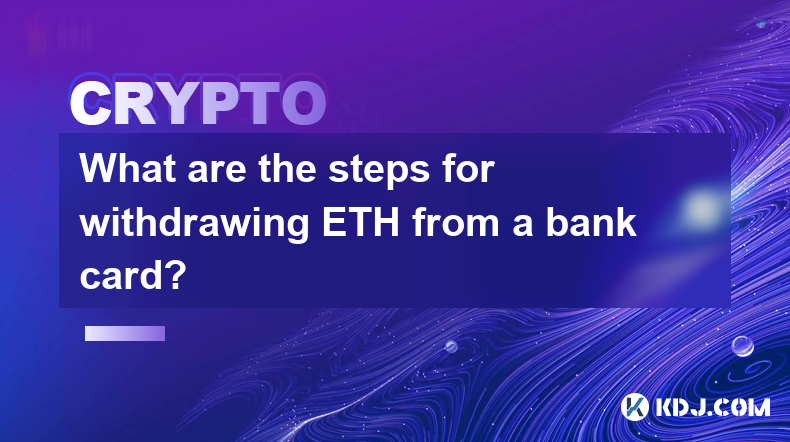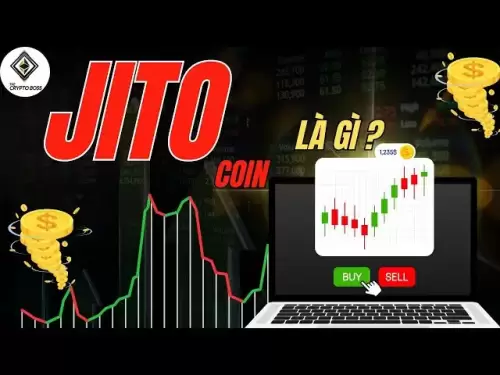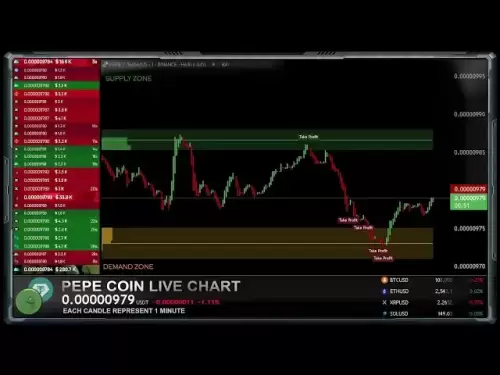-
 Bitcoin
Bitcoin $107,810.8710
-1.45% -
 Ethereum
Ethereum $2,531.4386
-1.75% -
 Tether USDt
Tether USDt $1.0000
-0.03% -
 XRP
XRP $2.2542
-0.99% -
 BNB
BNB $659.1350
-0.50% -
 Solana
Solana $148.5456
-2.40% -
 USDC
USDC $0.9999
-0.02% -
 TRON
TRON $0.2868
-0.44% -
 Dogecoin
Dogecoin $0.1666
-3.65% -
 Cardano
Cardano $0.5751
-2.36% -
 Hyperliquid
Hyperliquid $37.6845
-5.51% -
 Bitcoin Cash
Bitcoin Cash $494.9448
-0.65% -
 Sui
Sui $2.8396
-3.31% -
 Chainlink
Chainlink $13.2423
-2.59% -
 UNUS SED LEO
UNUS SED LEO $9.0482
0.02% -
 Stellar
Stellar $0.2467
-2.44% -
 Avalanche
Avalanche $17.8165
-3.63% -
 Shiba Inu
Shiba Inu $0.0...01158
-2.41% -
 Toncoin
Toncoin $2.7397
-3.42% -
 Hedera
Hedera $0.1560
-2.73% -
 Litecoin
Litecoin $85.8559
-2.34% -
 Monero
Monero $315.3710
-2.30% -
 Dai
Dai $1.0001
0.00% -
 Polkadot
Polkadot $3.3443
-2.03% -
 Ethena USDe
Ethena USDe $1.0001
0.01% -
 Bitget Token
Bitget Token $4.2888
-3.73% -
 Uniswap
Uniswap $7.3388
-1.57% -
 Aave
Aave $278.2986
-3.05% -
 Pepe
Pepe $0.0...09807
-3.67% -
 Pi
Pi $0.4563
-2.39%
What are the steps for withdrawing ETH from a bank card?
To withdraw ETH using a bank card, choose a reputable exchange, deposit funds, buy ETH, and transfer it to a personal wallet, ensuring to follow security best practices.
Apr 18, 2025 at 06:42 am

Withdrawing ETH from a bank card involves several steps that require careful attention to ensure a smooth and secure transaction. This process typically involves converting your fiat currency into Ethereum through a cryptocurrency exchange. Below, we detail the steps you need to follow to successfully withdraw ETH using a bank card.
Choosing a Suitable Cryptocurrency Exchange
The first step in withdrawing ETH from a bank card is to choose a reputable cryptocurrency exchange that supports bank card deposits and ETH withdrawals. Some popular options include Coinbase, Binance, and Kraken. Make sure the exchange is available in your region and supports your bank card type.
- Visit the exchange's website and sign up for an account if you don't already have one.
- Complete the verification process, which may involve submitting identification documents and proof of address.
- Once your account is verified, you can proceed to the next step.
Depositing Funds Using a Bank Card
After setting up and verifying your account on the chosen exchange, you need to deposit funds using your bank card. This step typically involves the following actions:
- Log in to your exchange account and navigate to the deposit section.
- Select 'Bank Card' as your deposit method.
- Enter the amount of fiat currency you wish to deposit. Be aware of any fees associated with the transaction.
- Enter your bank card details and complete the transaction. The funds should be credited to your exchange account within a few minutes to a few hours, depending on the exchange and your bank.
Purchasing Ethereum
Once the funds are available in your exchange account, you can proceed to purchase Ethereum. Here's how you can do it:
- Navigate to the trading section of the exchange.
- Select the ETH/fiat trading pair (e.g., ETH/USD if you deposited USD).
- Enter the amount of fiat currency you want to spend on ETH.
- Review the order details and confirm the purchase. The ETH will be credited to your exchange wallet.
Withdrawing Ethereum to a Personal Wallet
After purchasing ETH, you may want to transfer it to a personal wallet for better security. Follow these steps to withdraw ETH from the exchange:
- Go to the withdrawal section of the exchange.
- Select Ethereum (ETH) as the cryptocurrency you want to withdraw.
- Enter the amount of ETH you wish to withdraw.
- Provide the destination wallet address. Make sure to double-check the address to avoid sending your ETH to the wrong wallet.
- Confirm the withdrawal. The ETH should be transferred to your personal wallet within a few minutes to a few hours, depending on network congestion and the exchange's processing times.
Understanding Fees and Limits
It's crucial to be aware of the fees and limits associated with depositing funds via a bank card and withdrawing ETH. Each exchange has its own fee structure and limits, which can affect the overall cost and feasibility of the transaction.
- Deposit fees can range from 2% to 5% of the transaction amount, depending on the exchange and the type of card used.
- Withdrawal fees for ETH are typically a fixed amount per transaction, which can vary from exchange to exchange.
- Daily and monthly limits may apply to both deposits and withdrawals. Make sure to check these limits before proceeding with your transactions.
Ensuring Security and Best Practices
Security is paramount when dealing with cryptocurrencies. Here are some best practices to ensure the safety of your transactions and funds:
- Use strong, unique passwords for your exchange and wallet accounts.
- Enable two-factor authentication (2FA) wherever possible to add an extra layer of security.
- Keep your private keys and recovery phrases secure. Never share them with anyone.
- Regularly update your software and use reputable antivirus programs to protect against malware.
- Be cautious of phishing attempts and only enter your credentials on the official exchange website.
Troubleshooting Common Issues
Sometimes, you may encounter issues during the withdrawal process. Here are some common problems and their solutions:
- Transaction declined by the bank: Contact your bank to ensure they allow cryptocurrency-related transactions. Some banks may block transactions to exchanges due to fraud concerns.
- Withdrawal delays: Check the status of your withdrawal on the exchange. If it's pending, wait for it to process. If it's stuck, contact the exchange's support team.
- Incorrect wallet address: If you enter the wrong wallet address, the ETH may be lost. Always double-check the address before confirming the withdrawal.
Frequently Asked Questions
Q1: Can I withdraw ETH directly to my bank account?
No, you cannot directly withdraw ETH to a bank account. You must first convert your ETH to fiat currency on a cryptocurrency exchange and then withdraw the fiat to your bank account.
Q2: Are there any alternatives to using a bank card for depositing funds?
Yes, alternatives include bank transfers, PayPal, and other payment methods supported by the exchange. Each method may have different fees and processing times.
Q3: How long does it take to withdraw ETH to a personal wallet?
The time it takes to withdraw ETH to a personal wallet can vary from a few minutes to a few hours, depending on the exchange's processing times and network congestion.
Q4: What should I do if my bank card deposit is declined?
If your bank card deposit is declined, first check with your bank to ensure they allow transactions to cryptocurrency exchanges. If the issue persists, try using a different card or contact the exchange's support for assistance.
Disclaimer:info@kdj.com
The information provided is not trading advice. kdj.com does not assume any responsibility for any investments made based on the information provided in this article. Cryptocurrencies are highly volatile and it is highly recommended that you invest with caution after thorough research!
If you believe that the content used on this website infringes your copyright, please contact us immediately (info@kdj.com) and we will delete it promptly.
- Pump.fun's PUMP Token and Gate.io: A $4 Billion Meme Coin Gamble?
- 2025-07-08 16:30:12
- DigitalX, BTC Holdings, Funding Secured: Aussie Crypto Firm Goes Big on Bitcoin
- 2025-07-08 17:10:12
- Acquire.Fi: Navigating the Web3 M&A Landscape as a Consultant
- 2025-07-08 16:30:12
- Chainlink (LINK) Price Analysis: Navigating Uncertainty with Analysts' Insights
- 2025-07-08 16:50:12
- Rare 50p Coins Spark Bidding Wars: Are You Sitting on a Goldmine?
- 2025-07-08 16:50:12
- Iron Maiden's 50th Anniversary Gets Royal Treatment with Limited Edition Coin
- 2025-07-08 16:55:12
Related knowledge

How to customize USDT TRC20 mining fees? Flexible adjustment tutorial
Jun 13,2025 at 01:42am
Understanding USDT TRC20 Mining FeesMining fees on the TRON (TRC20) network are essential for processing transactions. Unlike Bitcoin or Ethereum, where miners directly validate transactions, TRON uses a delegated proof-of-stake (DPoS) mechanism. However, users still need to pay bandwidth and energy fees, which are collectively referred to as 'mining fe...

USDT TRC20 transaction is stuck? Solution summary
Jun 14,2025 at 11:15pm
Understanding USDT TRC20 TransactionsWhen users mention that a USDT TRC20 transaction is stuck, they typically refer to a situation where the transfer of Tether (USDT) on the TRON blockchain has not been confirmed for an extended period. This issue may arise due to various reasons such as network congestion, insufficient transaction fees, or wallet-rela...

How to cancel USDT TRC20 unconfirmed transactions? Operation guide
Jun 13,2025 at 11:01pm
Understanding USDT TRC20 Unconfirmed TransactionsWhen dealing with USDT TRC20 transactions, it’s crucial to understand what an unconfirmed transaction means. An unconfirmed transaction is one that has been broadcasted to the blockchain network but hasn’t yet been included in a block. This typically occurs due to low transaction fees or network congestio...

How to check USDT TRC20 balance? Introduction to multiple query methods
Jun 21,2025 at 02:42am
Understanding USDT TRC20 and Its ImportanceUSDT (Tether) is one of the most widely used stablecoins in the cryptocurrency market. It exists on multiple blockchain networks, including TRC20, which operates on the Tron (TRX) network. Checking your USDT TRC20 balance accurately is crucial for users who hold or transact with this asset. Whether you're sendi...

What to do if USDT TRC20 transfers are congested? Speed up trading skills
Jun 13,2025 at 09:56am
Understanding USDT TRC20 Transfer CongestionWhen transferring USDT TRC20, users may occasionally experience delays or congestion. This typically occurs due to network overload on the TRON blockchain, which hosts the TRC20 version of Tether. Unlike the ERC20 variant (which runs on Ethereum), TRC20 transactions are generally faster and cheaper, but during...

The relationship between USDT TRC20 and TRON chain: technical background analysis
Jun 12,2025 at 01:28pm
What is USDT TRC20?USDT TRC20 refers to the Tether (USDT) token issued on the TRON blockchain using the TRC-20 standard. Unlike the more commonly known ERC-20 version of USDT (which runs on Ethereum), the TRC-20 variant leverages the TRON network's infrastructure for faster and cheaper transactions. The emergence of this version came as part of Tether’s...

How to customize USDT TRC20 mining fees? Flexible adjustment tutorial
Jun 13,2025 at 01:42am
Understanding USDT TRC20 Mining FeesMining fees on the TRON (TRC20) network are essential for processing transactions. Unlike Bitcoin or Ethereum, where miners directly validate transactions, TRON uses a delegated proof-of-stake (DPoS) mechanism. However, users still need to pay bandwidth and energy fees, which are collectively referred to as 'mining fe...

USDT TRC20 transaction is stuck? Solution summary
Jun 14,2025 at 11:15pm
Understanding USDT TRC20 TransactionsWhen users mention that a USDT TRC20 transaction is stuck, they typically refer to a situation where the transfer of Tether (USDT) on the TRON blockchain has not been confirmed for an extended period. This issue may arise due to various reasons such as network congestion, insufficient transaction fees, or wallet-rela...

How to cancel USDT TRC20 unconfirmed transactions? Operation guide
Jun 13,2025 at 11:01pm
Understanding USDT TRC20 Unconfirmed TransactionsWhen dealing with USDT TRC20 transactions, it’s crucial to understand what an unconfirmed transaction means. An unconfirmed transaction is one that has been broadcasted to the blockchain network but hasn’t yet been included in a block. This typically occurs due to low transaction fees or network congestio...

How to check USDT TRC20 balance? Introduction to multiple query methods
Jun 21,2025 at 02:42am
Understanding USDT TRC20 and Its ImportanceUSDT (Tether) is one of the most widely used stablecoins in the cryptocurrency market. It exists on multiple blockchain networks, including TRC20, which operates on the Tron (TRX) network. Checking your USDT TRC20 balance accurately is crucial for users who hold or transact with this asset. Whether you're sendi...

What to do if USDT TRC20 transfers are congested? Speed up trading skills
Jun 13,2025 at 09:56am
Understanding USDT TRC20 Transfer CongestionWhen transferring USDT TRC20, users may occasionally experience delays or congestion. This typically occurs due to network overload on the TRON blockchain, which hosts the TRC20 version of Tether. Unlike the ERC20 variant (which runs on Ethereum), TRC20 transactions are generally faster and cheaper, but during...

The relationship between USDT TRC20 and TRON chain: technical background analysis
Jun 12,2025 at 01:28pm
What is USDT TRC20?USDT TRC20 refers to the Tether (USDT) token issued on the TRON blockchain using the TRC-20 standard. Unlike the more commonly known ERC-20 version of USDT (which runs on Ethereum), the TRC-20 variant leverages the TRON network's infrastructure for faster and cheaper transactions. The emergence of this version came as part of Tether’s...
See all articles

























































































